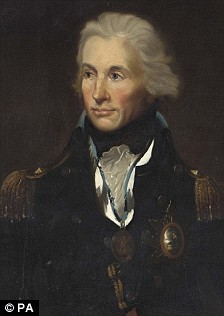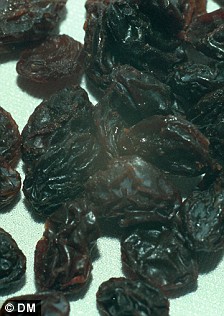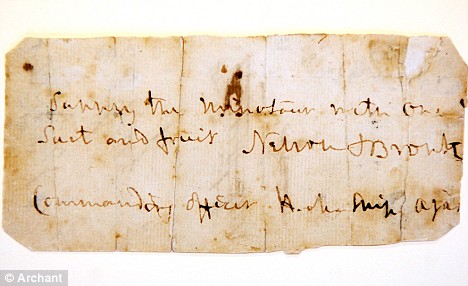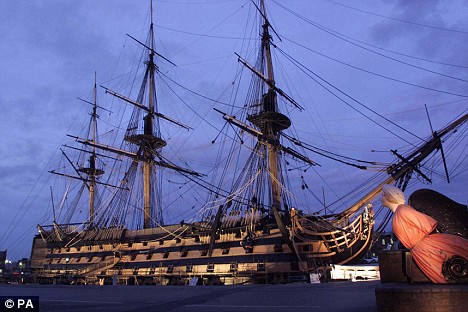A newly-restored letter written by Horatio Nelson reveals how raisins helped him to win the Battle of Trafalgar, a battle which eventually led to the downfall of Napoleon and France's expansionist ways.
Whilst on the Royal Navy warship HMS Minotaur in 1805, the Admiral wrote to a supply ship asking for more suet and raisins. These ingredients could have been combined to make one of Great Britain's favourite puddings, spotted dick.
Despite being outnumbered by a combined French/Spanish fleet, Britain's well-fed sailors who, unlike their French and Spanish counterparts were full-time professionals and more expert gunners, eventually won the day....
Lovingly restored Lord Admiral Nelson's letter reveals how raisins helped him win the Battle of Trafalgar
By Andy Dolan
25th November 2008
Daily Mail
He must have known that his audacious naval tactics would give him the upper hand against the Franco-Spanish fleet.
But Vice-Admiral Horatio Nelson wasn't taking any chances.
A newly discovered letter reveals that he also made sure his sailors went into the Battle of Trafalgar with full bellies.


Fruit fan: Admiral Nelson, above, insisted his brave crew had enough raisins
One week before the big day in 1805, the admiral wrote to a supply vessel asking for more raisins and suet.
The suet could have been used in a main meal, or the ingredients could have been combined to make spotted dog, now known as spotted dick.
The proof of his genius, was, as they say, in the pudding. The battle, in which an outnumbered British fleet prevailed, has gone down as one of the greatest naval victories of all time.
Enlarge
Lord Nelson's brief note, dated October 14, 1805, was written from the warship HMS Minotaur to the purser of the HMS Ajax, A Jackson. Part of it reads: 'Supply the Minotaur with one...suet and fruit.'
The letter is signed Nelson & Bronte, a name he assumed after the Battle of the Nile when he was granted a dukedom by the king of Naples, a British ally.
James Davey, of the Greenwich Maritime Institute, said: 'Nelson's letter would have referred to raisins, or possibly currants, as both could be stored for months at a time. It was standard practice to stock ships up with such dried fruit.'
Enlarge
In a newly-discovered letter, above, dated October 14, 1806, Nelson ordered a supply vessel to 'supply the Minotaur with one…. suet and fruit' - meaning raisins
The letter - which had been stuck to a piece of card - was donated to the Norfolk Nelson Museum in Great Yarmouth by an anonymous benefactor and will go on display in January in an exhibition about the admiral.
Faith Carpenter, museum curator, said: 'I think this letter shows that Lord Nelson was a master of command and logistics.

Battle winner: HMS Victory, Nelson's flagship, at Portsmouth Historic Dockyard
'Not only did he make tactical and strategic decisions of great importance, he cared about his men and made sure they were well provisioned.'
Lord Nelson perished in the Battle of Trafalgar on HMS Victory, but A Jackson, the purser of the 74-gun HMS Ajax, lived until he was 77 and died in 1836.
Both HMS Ajax and HMS Minotaur survived the ferocious battle off Cape Trafalgar, southern Spain, in which the British fleet was outnumbered 33 to 27 (though it did take combined fleets from two nations to do so).
dailymail.co.uk
Whilst on the Royal Navy warship HMS Minotaur in 1805, the Admiral wrote to a supply ship asking for more suet and raisins. These ingredients could have been combined to make one of Great Britain's favourite puddings, spotted dick.
Despite being outnumbered by a combined French/Spanish fleet, Britain's well-fed sailors who, unlike their French and Spanish counterparts were full-time professionals and more expert gunners, eventually won the day....
Lovingly restored Lord Admiral Nelson's letter reveals how raisins helped him win the Battle of Trafalgar
By Andy Dolan
25th November 2008
Daily Mail
He must have known that his audacious naval tactics would give him the upper hand against the Franco-Spanish fleet.
But Vice-Admiral Horatio Nelson wasn't taking any chances.
A newly discovered letter reveals that he also made sure his sailors went into the Battle of Trafalgar with full bellies.


Fruit fan: Admiral Nelson, above, insisted his brave crew had enough raisins
One week before the big day in 1805, the admiral wrote to a supply vessel asking for more raisins and suet.
The suet could have been used in a main meal, or the ingredients could have been combined to make spotted dog, now known as spotted dick.
The proof of his genius, was, as they say, in the pudding. The battle, in which an outnumbered British fleet prevailed, has gone down as one of the greatest naval victories of all time.
Enlarge

Lord Nelson's brief note, dated October 14, 1805, was written from the warship HMS Minotaur to the purser of the HMS Ajax, A Jackson. Part of it reads: 'Supply the Minotaur with one...suet and fruit.'
The letter is signed Nelson & Bronte, a name he assumed after the Battle of the Nile when he was granted a dukedom by the king of Naples, a British ally.
James Davey, of the Greenwich Maritime Institute, said: 'Nelson's letter would have referred to raisins, or possibly currants, as both could be stored for months at a time. It was standard practice to stock ships up with such dried fruit.'
Enlarge

In a newly-discovered letter, above, dated October 14, 1806, Nelson ordered a supply vessel to 'supply the Minotaur with one…. suet and fruit' - meaning raisins
The letter - which had been stuck to a piece of card - was donated to the Norfolk Nelson Museum in Great Yarmouth by an anonymous benefactor and will go on display in January in an exhibition about the admiral.
Faith Carpenter, museum curator, said: 'I think this letter shows that Lord Nelson was a master of command and logistics.

Battle winner: HMS Victory, Nelson's flagship, at Portsmouth Historic Dockyard
'Not only did he make tactical and strategic decisions of great importance, he cared about his men and made sure they were well provisioned.'
Lord Nelson perished in the Battle of Trafalgar on HMS Victory, but A Jackson, the purser of the 74-gun HMS Ajax, lived until he was 77 and died in 1836.
Both HMS Ajax and HMS Minotaur survived the ferocious battle off Cape Trafalgar, southern Spain, in which the British fleet was outnumbered 33 to 27 (though it did take combined fleets from two nations to do so).
dailymail.co.uk
Last edited: